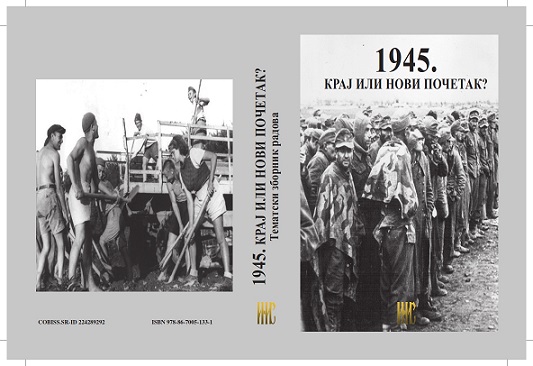Неостварени совјетски планови преобликовања политичке карте Балкана крајем Другог светског ратa
Unrealized Soviet Plans about Reshaping of the Political Map of the Balkans at the End of WW II
Author(s): Aleksej J. Timofejev
Subject(s): Political history, International relations/trade, WW II and following years (1940 - 1949), Peace and Conflict Studies
Published by: Institut za noviju istoriju Srbije
Keywords: World War Two; Balkans; Soviet foreign policy; Cold War; Greek Civil War; Soviet-Turkish relations; Soviet-Bulgarian relations;
Summary/Abstract: The final military operations at the end of the war in the Balkans were important in the context of transformation of WW II into a conflict of the former allies. As Germany’s power waned, the Western Balkans became one of the zones where spheres of interest were to be delimitated. Conflicting Soviet and US/UK interests in the Eastern Balkans, in the hinterland of the Straits, had a larger conflict potential in the context of sudden enlargement of the Soviet zone of interest. This conflict connected with the inner Balkans was especially acute on the Mediterranean coasts. The importance of the Straits for Russia was immense already in early 20th century. During WW II the situation with delimitation of imperial zones of influence in the Balkans partly resembled the one in WW I. The USSR had reserve plans for a counter-offensive in case of the Allied betrayal that were the fruit of the possibility of the first blow being stricken by British and American forces and their potential allies - the Germans, the Italians. On the local Balkan level such documents were no secret. Tense expectation of the Soviet forces on the borders of Greece and Turkey peaked twice in the HQ of the 37th Army Division in connection with global developments – the end of WW II in Europe (spring 1945) and the final end of WW II (late summer, fall 1945). In the first case the plans were exclusively defensive and in the second they comprised (counter) attack. No doubt, these plans were only elements of both the regional policy of the USSR (support for Greek partisans through Yugoslavia and Albania, reliance on Kurdish insurgents in Iran) and the global construction of opposition to the USA and UK - which goes beyond the scope of this article.
Book: 1945. Kpaj или нови почетак?
- Page Range: 161-183
- Page Count: 23
- Publication Year: 2016
- Language: Serbian
- Content File-PDF

